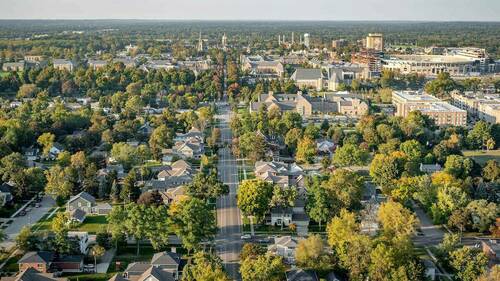
The Carnegie Foundation for the Advancement of Teaching has again recognized the University of Notre Dame with the Community Engagement classification, citing excellent alignment among the University’s mission, culture, leadership, resources and practices in support of “dynamic and noteworthy community engagement.”
The Carnegie Foundation introduced the Community Engagement classification as an elective classification in 2006, and Notre Dame has held the classification since 2010, when it first applied for it on a 10-year cycle.
Now on a six-year cycle, the classification recognizes “collaboration between institutions of higher education and their larger communities (local, regional/state, national, global) for the mutually beneficial exchange of knowledge and resources in a context of partnership and reciprocity.”
Notre Dame is among 359 institutions that now hold the classification, including 119 from this cycle.
The University will need to reapply for the classification in six years.
“Notre Dame’s commitment to community is rooted in the University’s Catholic ethos and character, building on the good works of our students, faculty and staff,” said Notre Dame President Rev. John I. Jenkins, C.S.C. “The Carnegie classification is an important recognition of their initiatives.”
Jay Brandenberger, director of academic community engagement at the Office of the Provost and associate director of the Center for Social Concerns at Notre Dame, said, “Notre Dame has a long history of putting into action Father Sorin’s founding vision that University will become ‘one of the most powerful means for doing good in this country.’ We celebrate this recognition from the Carnegie Foundation, knowing it is possible only through the goodwill and commitment of a network of community partners near and far.”
Brandenberger chairs the Community Engagement Coordinating Council, which led the application for the reclassification — an 18-month process that involved data collection and documentation of important aspects of institutional mission, identity and commitments.
In recognizing Notre Dame, the Carnegie Foundation noted the University’s long history of engagement, from the work of the Robinson Community Learning Center, the Center for Social Concerns, the Institute for Educational Initiatives and the William J. Shaw Center for Children and Families, to community-based research, learning and service and voluntary contributions to communities and organizations in the South Bend-Elkhart region and beyond.
More recently, the University formed the Community Engagement Coordinating Council to integrate the many campus structures and entities that support outreach and to help enhance the University’s “engaged” status; added a new rotating faculty position, the director of academic community engagement, to the Office of the Provost; developed a University-wide portal, EngageND, to track engagement efforts and share resources; developed a summer faculty institute focused on engagement; expanded support for the Center for Social Concerns and Robinson Center; more deeply engaged graduate students with the creation of a Certificate for Community Engagement and Public Scholarship; established the Center for Civic Innovation; and enhanced engaged scholarship and research through a variety of initiatives, leading to such sustained projects as the Bowman Creek Educational Ecosystem.
Of the 119 institutions classified or reclassified this cycle, 67 are public and 52 are private. By basic classification, 52 are research universities, 39 are master’s colleges and universities, 22 are baccalaureate colleges, three are community colleges and three have a specialized focus. The institutions represent 37 states and U.S. territories.
“These newly classified and reclassified institutions are doing exceptional work to forward their public purpose in and through community engagement that enriches teaching and research while also bettering the broader community,” said Mathew Johnson of the Carnegie management team.
Since 1970, the Carnegie Foundation for the Advancement of Teaching has classified American colleges and universities as a research tool to represent and support the diversity of U.S. higher education.
For more information, visit engagement.nd.edu.
Contact: Jay Brandenberger, director of academic community engagement, 574-631-7943, jbranden@nd.edu
Originally published by at news.nd.edu on January 31, 2020.